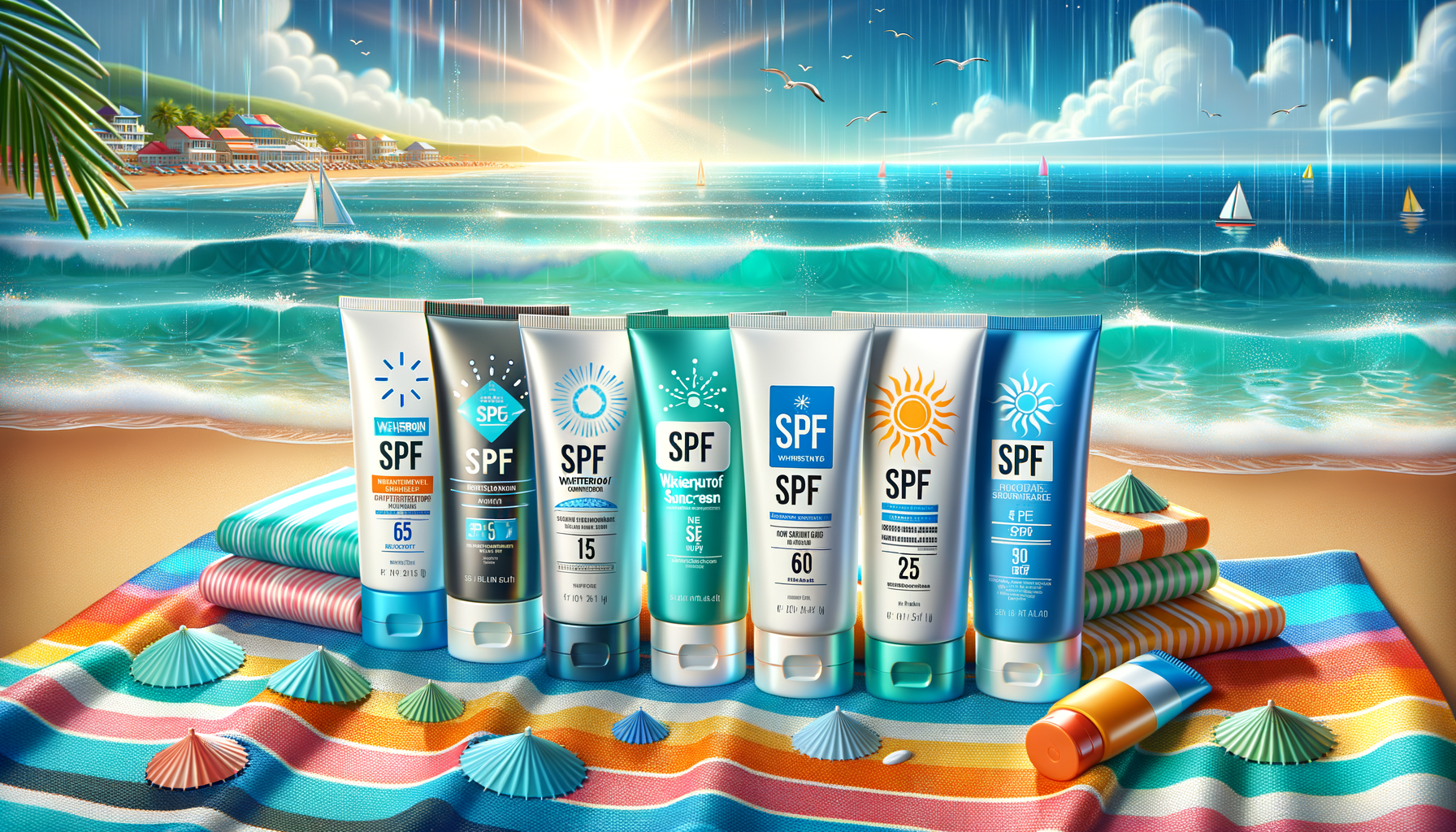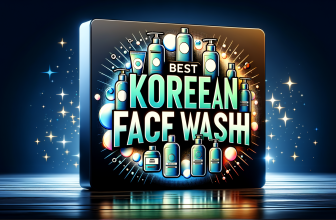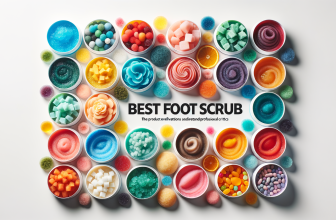
Are you stepping out into the sun and worried about protecting your skin? Ponder for a moment about how often you find yourself looking for a sunscreen that stays on through sweat, water, and the general chaos of a busy day outdoors. Finding a sunscreen that can keep up with your active lifestyle, and that actually lives up to its waterproof claims, can be a daunting task. But don’t worry, because we’ve done the legwork for you by identifying the best waterproof sunscreens that provide effective UV protection while also being resilient against water and sweat.
Our Top Picks
Our #1 Top Pick: La Roche-Posay Anthelios Melt-In Sunscreen Milk SPF 60
For those seeking a sunscreen that combines maximum sun protection with a velvety texture that melts into the skin, the La Roche-Posay Anthelios Melt-In Sunscreen Milk is a front-runner. Its broad-spectrum SPF 60 coverage shields against both UVA and UVB rays, and the advanced Cell-Ox Shield technology ensures a durable, waterproof barrier. This sunscreen milk is not only favored for its high efficacy but is also renowned for its antioxidant-rich formula and suitability for sensitive skin. Whether you’re planning a day at the beach or a lengthy hike, its water-resistant qualities maintain protection even after 80 minutes in the water.
Pick #2: Blue Lizard Australian Sunscreen – Sport Mineral-Based Sunscreen SPF 30+
Blue Lizard Australian Sunscreen excels in the realm of mineral sunscreens. With an SPF of 30+, this sport formula offers excellent broad-spectrum protection while being reef-safe, as it’s free from oxybenzone and octinoxate. What makes it particularly standout in the waterproof category is its smart bottle technology, which turns blue in harmful UV light, reminding you to apply. Dermatologist-recommended and water-resistant for up to 80 minutes, the Blue Lizard Sport sunscreen adheres to your skin through intense activities and swimming, making it an excellent pick for eco-conscious outdoor enthusiasts.
Pick #3: Neutrogena Ultra Sheer Dry-Touch Water-Resistant Sunscreen SPF 100+
Neutrogena is a hallmark of quality in skincare, and its Ultra Sheer Dry-Touch Sunscreen lives up to the brand’s reputation. With an impressive SPF 100+, the protection it provides is robust, and it remains water-resistant for 80 minutes. The Dry-Touch technology ensures a lightweight, non-greasy feel, and the formula absorbs quickly, leaving a matte finish. This sunscreen not only defends against sunburn but also reduces the risk of skin cancer when used as directed with other sun protection measures.
Pick #4: EltaMD UV Sport Broad-Spectrum SPF 50
EltaMD’s UV Sport Broad-Spectrum SPF 50 is a top-tier choice for athletes and those with an active lifestyle. The water-resistant formula (effective for up to 80 minutes in water) is designed not to drip or run into the eyes, making it excellent for high-intensity sports where sweating is inevitable. It’s a broad-spectrum sunscreen that combats UVA and UVB rays comprehensively and is also packed with Zinc Oxide, which is known for its skin-soothing properties. With its non-comedogenic and fragrance-free qualities, it’s safe for all skin types, including those with sensitive skin.
Pick #5: Coppertone Sport Continuous Sunscreen Spray Broad Spectrum SPF 50
Coppertone Sport Continuous Sunscreen Spray is a favorite for those who prefer the convenience of a spray-on sunscreen. The broad spectrum SPF 50 offers solid protection, and the formula is water-resistant for up to 80 minutes. It’s designed to stay on strong when you sweat, providing reliable protection throughout all your outdoor activities. This sunscreen won’t clog your pores or cause breakouts, making it an excellent choice for people who are looking for effective protection without the heavy feeling of traditional sunscreens.
What to Know Before You Buy
- Broad Spectrum Protection: The best waterproof sunscreens offer broad spectrum protection, which means they protect against both UVA and UVB rays.
- Water Resistance: If a sunscreen is labeled as “water-resistant,” it must specify whether it lasts for 40 or 80 minutes while swimming or sweating.
- SPF Rating: Higher SPF ratings indicate more protection, but SPF 30 is usually sufficient for most people if reapplied regularly.
- Reapplication: Even the best waterproof sunscreens need to be reapplied every two hours or immediately after swimming, toweling off, or sweating a great deal.
- Skin Type: Consider whether you have sensitive skin, and look for sunscreens specifically designed to be gentle or suitable for various skin conditions.
Factors to Consider Before Buying
- Ingredient Preferences: Do you prefer chemical sunscreens for their lightweight feel, or mineral sunscreens for their natural protective layer? Your preference will significantly influence your choice.
- Application Method: Creams, lotions, gels, sprays, and sticks offer different levels of convenience and coverage. Choose what works best for your lifestyle and skin.
- Skin Compatibility: Those with acne-prone or sensitive skin should look for non-comedogenic and hypoallergenic formulas, respectively.
- Environmental Impact: Consider environmentally-friendly options that are free of oxybenzone and octinoxate, which have been found to be harmful to coral reefs.
- Duration of Exposure: If you’ll be outdoors for extended periods, look for sunscreens with higher water resistance and SPF to ensure continuous protection.
Why Trust ChooseRight?
At ChooseRight, our dedication to providing thorough and unbiased reviews is paramount. We have combed through thousands of customer reviews and incorporated feedback from skincare professionals to curate this list of the best waterproof sunscreens. Each product has been evaluated based on its protective qualities, user experience, and resistance to water and sweat. Our top picks are selected with care, ensuring you have access to the most reliable and effective sun protection options available.
Finishing Thoughts
Finding the best waterproof sunscreen is a crucial step in protecting your skin from the sun’s harmful rays while enjoying water activities or outdoor sports. The recommended products above are each known for their efficacy, quality ingredients, and ability to hold up against water and sweat. Whether you opt for a high SPF lotion, a mineral-based cream, a convenient spray, or a gentle formula for sensitive skin, the key is to apply your sunscreen correctly and reapply as needed to maintain protection. Armed with the right product, you can enjoy the sun safely and without worry.
Frequently Asked Questions
What makes sunscreen “waterproof”?
Waterproof sunscreens are formulated to provide a certain level of sun protection that remains effective after the wearer has been in water for a specified amount of time. This usually means that the sunscreen contains ingredients that can resist being washed off by water or sweat to some degree.
How long does waterproof sunscreen last?
The duration a waterproof sunscreen remains effective can vary depending on the product. Most waterproof sunscreens are tested to maintain their SPF level after 40 to 80 minutes of water exposure. Always check the product label for the specific water resistance duration.
Do I need to reapply waterproof sunscreen?
Yes, you still need to reapply waterproof sunscreen, particularly after swimming, sweating, or toweling off. Even though it’s designed to be water-resistant, its effectiveness diminishes over time, especially with physical activity.
Can waterproof sunscreen be used on any skin type?
Most waterproof sunscreens are suitable for all skin types, but if you have sensitive skin or skin conditions, it’s best to look for a formula designed for your specific needs, such as fragrance-free or non-comedogenic options.
Is waterproof sunscreen safe for coral reefs and marine life?
Not all waterproof sunscreens are reef-safe. To ensure that you’re using an environmentally friendly option, look for sunscreens that are labeled as “reef-safe” and do not contain oxybenzone and octinoxate, which are known to harm coral reefs.
What’s the difference between water-resistant and waterproof sunscreen?
The terms water-resistant and waterproof are often used interchangeably, but they can mean different things when it comes to sunscreen efficacy. The FDA no longer allows the term “waterproof” because no sunscreens are completely impervious to water. Instead, they are labeled as water-resistant with a specified duration of effectiveness (either 40 or 80 minutes).
How much waterproof sunscreen should I apply?
It is recommended to apply a generous amount of sunscreen — about one ounce (or enough to fill a shot glass) for full body coverage. Be sure to cover all exposed skin, and pay special attention to areas that might be easily missed, like the back of the knees, tops of the feet, and the hairline.
Can I apply waterproof sunscreen to my face?
Yes, waterproof sunscreen can be applied to the face, but ensure it is non-comedogenic (won’t clog pores) if you have oily or acne-prone skin. You might also want to use a formula specifically designed for facial skin, as these can be less irritating to the sensitive eye area.
Is waterproof sunscreen only necessary for swimming?
While waterproof sunscreen is essential for activities that involve water, it’s also useful for sports or outdoor activities where sweating is likely, as it is better at staying on the skin during these conditions than non-water-resistant formulas.
How should I remove waterproof sunscreen?
Since waterproof sunscreen is designed to stick to your skin, you might need a gentle cleanser or oil-based makeup remover to fully wash it off. Double cleansing, which involves using a cleaning oil followed by a water-based cleanser, can also be effective in removing water-resistant sunscreen.







